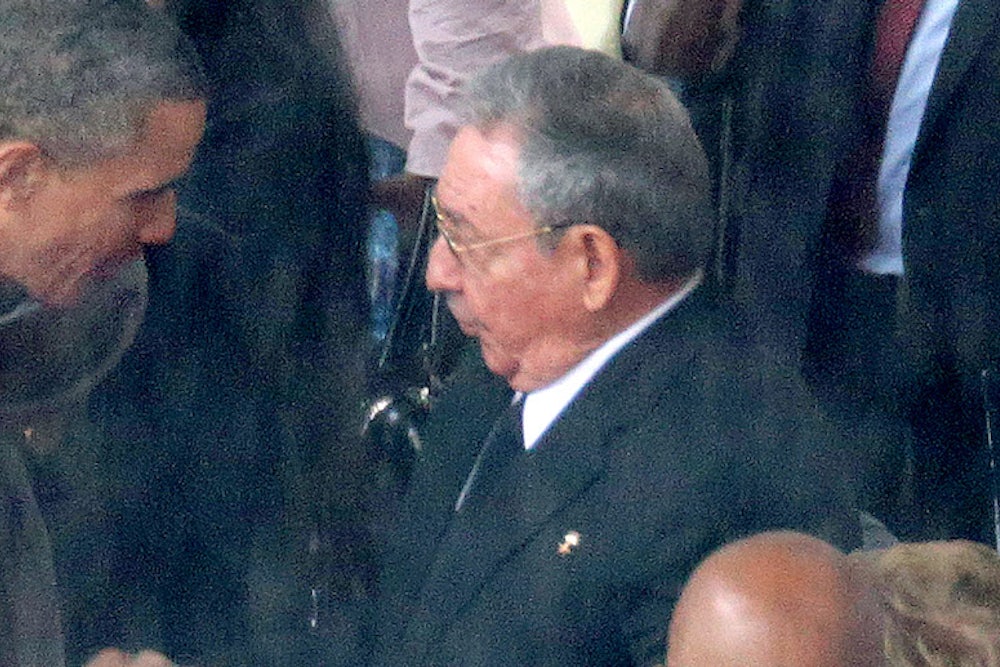The handshake between President Obama and Cuban leader Raul Castro at Nelson Mandela’s funeral has, by now, been interpreted as everything from a symbol of warming relations to evidence of Obama’s inner-communist. But the greeting was probably less about politics, and more about simply being polite: At the memorial service for a revered world leader, Obama ascended the stairs. And there was Castro.
“He [Obama] looks up and there he is. There isn’t really much he could do but shake his hand,” says Pamela Eyring, president of The Protocol School of Washington, which teaches cross-cultural understanding and international etiquette. Eyring also served as the Chief of Protocol for the Wright-Patterson Air Force Base in Ohio, where she oversaw the arrangements—seating, beverages—for the talks leading up to the Dayton Accords. She says protocol officers do their best to separate personalities and politicians at-odds, but sometimes events or circumstances push people together. In those cases, you take the high road.
It’s not like Obama could “offer the hand and swipe the side of his hair,” she says.
The White House announced that the greeting was “unplanned,” and Eyring also noted that Obama looked a bit surprised by the encounter. “What I noticed was he did not hold eye contact very long, and tried to divert his eyes to the right,” she says, probably to keep the handshake as short and sweet as possible. She says that, and relieving tension quickly in the hand, are the signs to cut short a hello. “You’re at funeral, what are you going to do? Not shake his hand?”
Former Ambassador Mary Mel French, who served as U.S. Chief of Protocol from 1997 to 2001 under President Clinton and wrote a book on diplomatic protocol, agreed that Obama acted appropriately from a protocol standpoint. “It’s not ever appropriate to not have good manners and snub someone at an event like this. Obama did what he should have done.”
French says with any major international event—be it a funeral, a state dinner, or a summit—the host country determines where each leader sits or stands, who they’re sitting next to, and the order of speakers. The visiting countries can and do make requests—French once had to scramble to get the president’s seating switched at a dinner where he had been placed next to Muammar Gaddafi’s son—and host countries will make concessions. “We do the same,” French adds. But the final say rests with the hosts.
Though politicking exists, Chris Young, the president of Protocol & Diplomacy International and former chief of protocol for Georgia (the U.S. state), says countries rely on precedence, a custom for ranking high-level officials. Heads of state get preferential treatments—the prime seats on the stage, for example. But to keep affairs egalitarian, usually attending heads of state are ordered uniformly, either by time in office (more common for ambassadors) or alphabetically. French says South Africa’s protocol looks as if it might have been arranged alphabetically: after Castro, Brazil’s president, Dilma Rousseff, was next in the receiving line to the podium. (It’s also been pointed out that Obama and Rousseff exchanged a friendly handshake and kiss, despite not being on the best of terms, thanks to the NSA.)
Credit the South African government, then, with Obama-Castro run-in. But Young also says while South Africa probably put a general plan in place for Mandela’s funeral, they didn’t have a whole lot of time to gather the guest list and smooth out the details for one of the biggest gatherings of world leaders in recent history. Young also notes that unlike, at say, the United Nations General Assembly (where Obama himself was recently snubbed), the usual entourage of aides and handlers who run interference—usher the president away, or deflect any unwanted handshakes—weren’t around. It was just Obama and Castro, mano-a-mano.
And then the real reason more than more than 90 heads of state gathered in South African soccer stadium: to honor the life Nelson Mandela, who embodied reconciliation, forgiveness, and respect. To do anything but honor the day, "would have embarrassed the country and embarrassed Mandela,” French says. The meaning of the day—and the man behind it—matter.
But sometimes a handshake is just a handshake.
